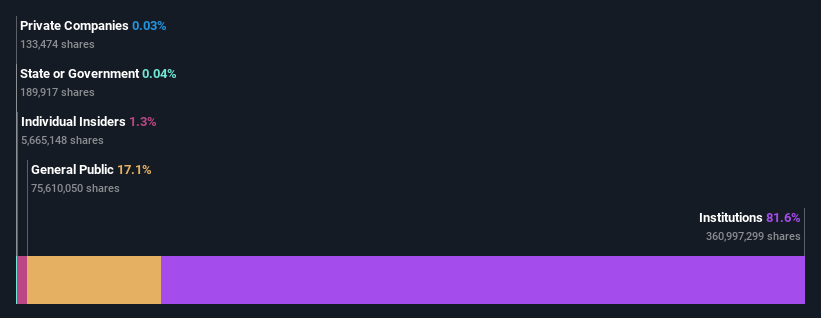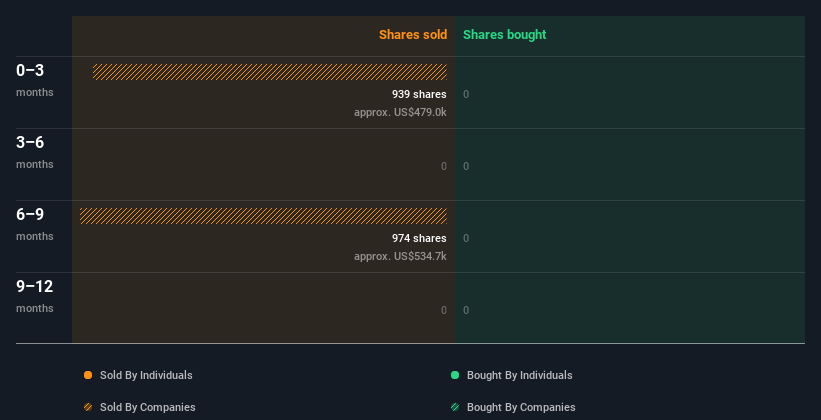
Netflix (NasdaqGS:NFLX) just came under scrutiny as the Securities and Exchange Commission(SEC) announced insider trading charges against former employees.
It seems that the company's policy about data transparency ahead of the earnings release is starting to backfire. Today we will examine the current state of the ownership structure as well as legal insider transactions.
Recent Developments
SEC charged 3 former Netflix software engineers for illegal insider trading. The regulatory agency claims that former engineers along with two associates generated over US$3m in profits by using the confidential information about Netflix subscriber growth – a key metric that moved the stock in recent years.
For those who followed the co-CEO Reed Hastings, this scenario was all but inevitable, as he once stated that Netflix is perhaps the only public company that shares financial results internally in the weeks before the quarter is closed. Apparently, confidential information reaches hundreds of employees, and some of them would inevitably succumb to the opportunity.
Interestingly, just last year Hastings proclaimed that it is surprising that nobody from Netflix has been to jail.
The question is: Are there any more examples like this?
Meanwhile, Netflix keeps ahead of the main competitor Disney+. According to Nielsen's ratings that measure viewership in streamed minutes, Netflix's Virgin River recently had double the viewership of the 2nd placed Disney's show, Loki.
With a market capitalization of US$231b, Netflix is a rather large company. Normally institutions would own a significant portion of a company this size.
We can zoom in on the different ownership groups to learn more about Netflix.
Check out our latest analysis for Netflix

What Does The Institutional Ownership Tell Us About Netflix?
Institutional investors commonly compare their own returns to the returns of a commonly followed index. So they generally do consider buying larger companies that are included in the relevant benchmark index.
Netflix already has institutions on the share registry, and they own a respectable stake in the company. This suggests some credibility amongst professional investors. However, if multiple institutions change their view on a stock simultaneously, you could see the share price drop fast.
Institutional investors own over 50% of the company, so together can likely influence board decisions. Hedge funds don't have many shares in Netflix. Capital Research and Management Company is currently the company's largest shareholder with 14% of shares outstanding. For context, the second-largest shareholder holds about 7.5% of the shares outstanding, followed by ownership of 6.2% by the third-largest shareholder. Finally, CEO Wilmot Hastings is the owner of 1.1% of the company's shares.
If you do the math, you will find that the top 15 have the combined ownership of 51% in the company, suggesting that no single shareholder has significant control over the company.
General Public Ownership
The general public holds a 17% stake in Netflix.This size of ownership, while considerable, may not be enough to change company policy if the decision is not in sync with other large shareholders.
Insider Ownership And Transactions
Insider ownership is positive when it signals leadership is thinking like the true owners of the company. However, high insider ownership can also give immense power to a small group within the company. This can be negative in some circumstances.
The insiders have a meaningful stake worth US$3.0b, yet, there haven't been any meaningful transactions in the last 12 months, at least not reported.
You can see the insider transactions (companies and individuals) over the last year depicted in the chart below. By clicking on the graph below, you can see the precise details of each insider transaction!

Next Steps:
While it is well worth considering the different groups that own a company, other factors are even more important. Consider risks, for instance. Every company has them, and we've spotted 1 warning sign for Netflix you should know about.
For additional Netflix research, you can check this free report showing analyst forecasts for its future.
NB: Figures in this article are calculated using data from the last twelve months, which refer to the 12-month period ending on the last date of the month the financial statement is dated. This may not be consistent with full-year annual report figures.
Valuation is complex, but we're here to simplify it.
Discover if Netflix might be undervalued or overvalued with our detailed analysis, featuring fair value estimates, potential risks, dividends, insider trades, and its financial condition.
Access Free AnalysisHave feedback on this article? Concerned about the content? Get in touch with us directly. Alternatively, email editorial-team@simplywallst.com
Simply Wall St analyst Stjepan Kalinic and Simply Wall St have no position in any of the companies mentioned. This article is general in nature. We provide commentary based on historical data and analyst forecasts only using an unbiased methodology and our articles are not intended to be financial advice. It does not constitute a recommendation to buy or sell any stock and does not take account of your objectives, or your financial situation. We aim to bring you long-term focused analysis driven by fundamental data. Note that our analysis may not factor in the latest price-sensitive company announcements or qualitative material.

Stjepan Kalinic
Stjepan is a writer and an analyst covering equity markets. As a former multi-asset analyst, he prefers to look beyond the surface and uncover ideas that might not be on retail investors' radar. You can find his research all over the internet, including Simply Wall St News, Yahoo Finance, Benzinga, Vincent, and Barron's.
About NasdaqGS:NFLX
Outstanding track record with excellent balance sheet.
Similar Companies
Market Insights
Community Narratives


